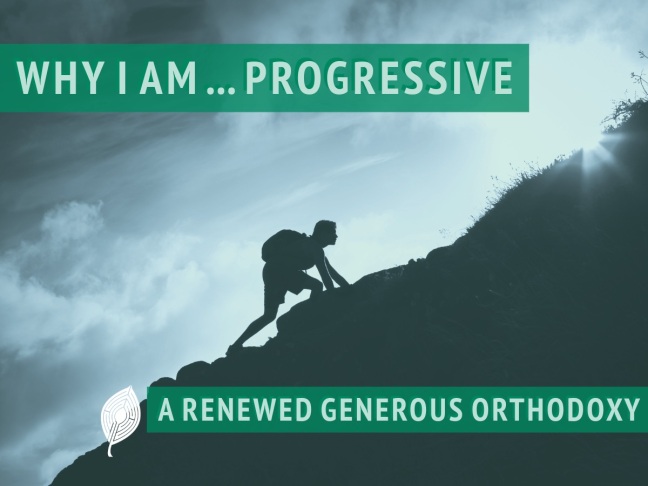This series is about finding a way forward theologically by celebrating the strengths of different Christian traditions or movements. Last time, I explored the value of Tradition — how it means we don’t have to reinvent the wheel in every generation, how it challenges our assumptions, deepens our understanding and experience of God, and how it allows us to be honest about our theological and spiritual influences. But this is not the end of the story. For unless we delude ourselves, we must admit that those who came before us did not get everything right, and some times (the Crusades, antisemitic pogroms, the Doctrine of Discovery and other theological buttresses to European imperialism and the Atlantic slave trade, Indian Residential Schools, and the harbouring of known sexual predators to name just a few) got things very, very wrong. We have not just the right but the responsibility to be intentional about what we’re passing on to the next generations and why. This present- and future-oriented aspect of the faith is why, as much as I am ‘traditional’, I am also ‘progressive.’
‘Progressive’ is a broad term, and is therefore not entirely helpful without some definition. In the most obvious sense, it means ‘oriented towards progress’, but then we have to define what it is we mean by ‘progress’. After all, one person’s idea of progress is another person’s vision of hell. For me, it has two prongs. The first is an openness to critiques of traditional beliefs and practices; the second evaluates both these critiques and the tradition against the example of Jesus in the New Testament.
I wrote about the role of critique in my series on Tradition a couple years ago. When discussing the idea of ‘faithfulness’ to tradition, I concluded:
To the ancient question of how we can receive the tradition authentically, we must add the modern question of how to do so without being stifled by it, and the postmodern question of how to do so in a way that does not perpetuate — or even sacralize or idolize — past harmful dynamics that have lasting legacies into the world today.
To put it another way, Modernity asks of Tradition the important question of whether Tradition actually does what it says it does and Postmodernism holds Tradition accountable for who it has left out and what damage it has done.
When it comes to these questions, so many Christians have a knee-jerk, reactionary conservatism that insists Christianity as we know it is not to be criticized. But it seems to me that these are just the kinds of questions that motivated Jesus: Did the Pharisees’ traditions and assumptions about the Law (say, Sabbath-keeping, or tithing) allow the Law to function as intended, or did they create unnecessary burdens on everyday people? Did the religion of his day unfairly marginalize Samaritans, Gentiles, women, or those living with any kind of physical disability? If Jesus himself was not only unafraid of such critique of Tradition but actively engaged in it, surely those of us who claim to follow him should share his approach! This is not to say the critiques from the world are always right, or that our answer to the world will always be ‘yes’; just that we will be open-hearted and listen, and try to work towards a ‘yes’ as much as we can in good conscience, that we should be looking for reasons and ways to keep the doors open for people, not slam them in their faces.
When I look at the main critiques Traditional Christianity has faced over the past couple centuries from ‘the world’, I see that so many of them are the very critiques Jesus and the prophets before him leveled at their own received religious traditions: that they prop up the rich and powerful at the expense of the poor and marginalized, that they exclude those whom God would welcome, that they promote injustice instead of justice, and focus on minor details to justify ignoring main points. And so, in a sense I am progressive because the most powerful parts of our Tradition are too. I am progressive because Isaiah was. I am progressive because Jesus was. It’s all about Jesus, who insisted that it is the meek, the humble, those who mourn who are blessed, who made friends with those his society rejected, who proclaimed that sin and holiness are not just about outward acts but about the disposition of heart, who rejected retributive justice, loving his enemies and forgiving his torturers.
So then, why am I ‘progressive’? I am progressive because the world — and Church — as we have known it has still yet to even approach the vision of the Kingdom of God advocated by Jesus. I am under no illusion that we’ll ever get there, but that doesn’t mean we shouldn’t spend our lives doing everything we can to move forward. As Fr. Alexander Men put it:
Christ calls humanity to bring about the divine ideal. Only near-sighted people can suppose that Christianity has seen its time. Christianity has only taken its first, I would say timid, steps in human history. To this day many of Christ’s words are incomprehensible because we are still moral and spiritual cavemen. The gospel arrow is aimed towards eternity, and that which we call Christian history is in many ways a series of clumsy and unsuccessful attempts to bring Christianity about. (”Christianity,” talk given September 8, 1990)
I am progressive because, as beautiful, true, holy, and transformational as Tradition may be, we still have so so far to go.


5 thoughts on “Why I Am … Progressive”